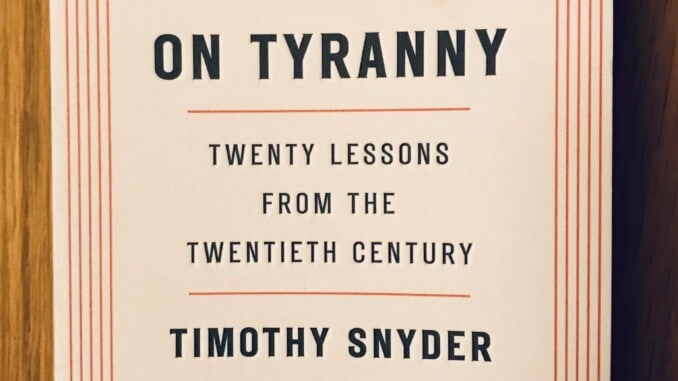
The text of Timothy Snyder’s On Tyranny – 20 Lessons from the 20th Century is brief, blunt, essential reading right now. The advice of Snyder, a historian and a specialist in totalitarianism, is as simple and solid as any statement could be.
Like any list, there are some points that stand out more than others. The first item – Do Not Obey in Advance – is attention getting. Most of us have to stop and consider if that is, in fact what we are doing.
This volume was published in 2017, so if you have not read it yet, consider if it’s time to do that. But just consider. Don’t obey in advance.
This is profoundly crucial stuff, and I’ve taken to carrying it in my bag, along with a copy of the Constitution. You just never know when you might have a moment, standing in line waiting, to remind yourself you have rights. Inalienable rights.
Maybe you are already someone who questions authority tirelessly and constantly. Or you might be someone who just does what they are told without reflection. We get a lot of directives in the course of the day.
Break the habit of thinking that there is a reason for a directive unless you actually know what it is.
The ongoing traumatic assault on our community – people who have lived and worked here for decades being abducted by masked gunmen – is daunting. But assuming there is some reason for it – not questioning authority – is not going to stop it.
When “Question Authority” was a slogan people wore on lapel buttons and t-shirts, way back in the 20th Century, another slogan took it farther. “Question Reality” was often seen a joke put on by people using psychedelics – that’s kind of a lot to question. Or is it?
The 1998 film The Truman Show is categorized as both a comedy and a drama. If your life was being broadcast as a reality show, would that be funny to you? Or is it only funny if it’s someone else? How would you pull back the curtain?
As someone who loves to consume information, it’s pretty automatic for me to consider the source. If its a novel or a newspaper or a social media post; who is framing this, and why?
The assumptions are often easy to spot. Re-adjusting the lenses so that other kinds of focus can be used can open up a lot more information.
Why limit questions? Ask yourself if this is the society you want to live in. Ask your friends and family how they feel, and what they are doing to resist the insanity?
From Snyder, “Most of the power of authoritarianism is freely given. In times like these, individuals think ahead to what a more repressive government will want, and then offer themselves without being asked. A citizen who adapts in this way is teaching power what it can do.”
Judith Martin-Straw


